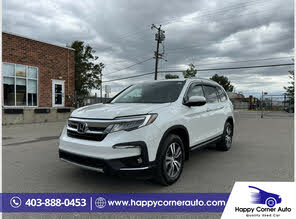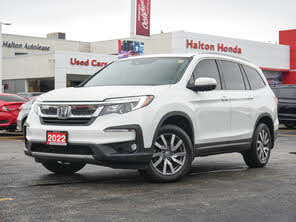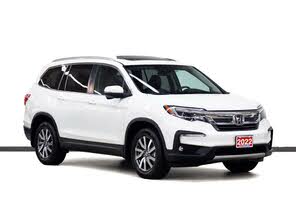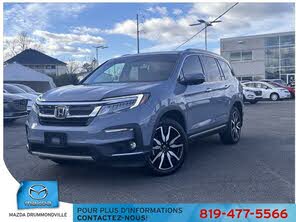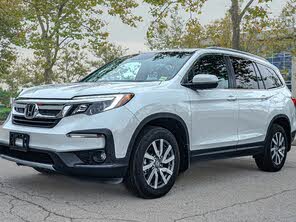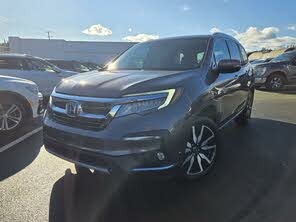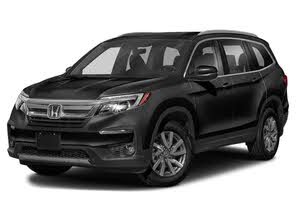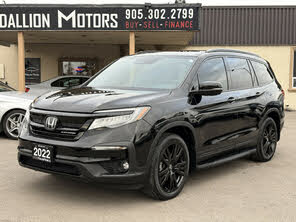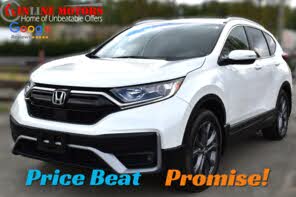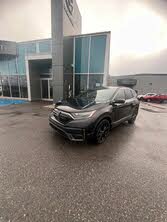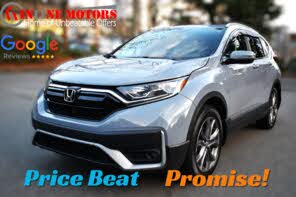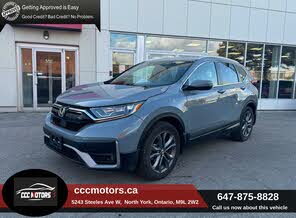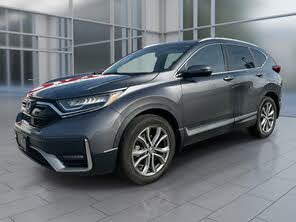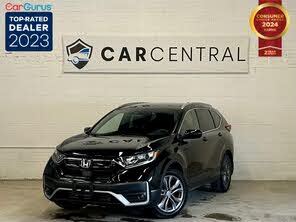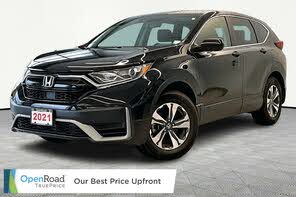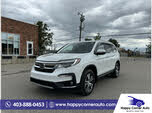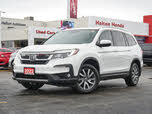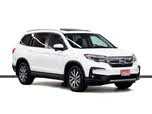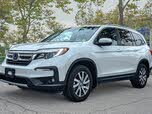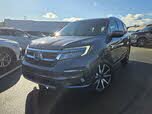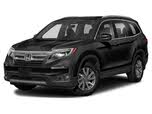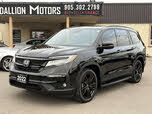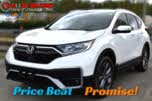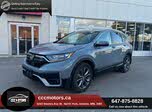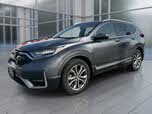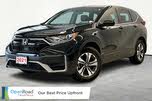2022 Honda Pilot vs 2021 Honda CR-V
Overview | |
MSRP$25,350 | MSRP$38,080 |
Average price$30,681 | Average price$42,321 |
Listings389 | Listings84 |
Ratings & Reviews | |
User Reviews | User Reviews |
Expert reviews7.8 out of 10 | Expert reviews |
2021 Honda CR-V Reviews SummaryEven in a grim year, Honda is selling a staggering number of CR-Vs. The CR-V is the best-selling Honda in Canada, edging out the home-built Honda Civic. The CR-V is also the second best-selling compact SUV, just behind the Toyota RAV4. And it was the sixth best-selling vehicle in Canada in 2021. So, it’s hard to argue against the CR-V formula. Honda’s been at this almost as long as crossovers have been a thing, launching the CR-V in 1997—a year after the RAV4 debuted. The funny thing is, aside from sales volume, there’s only one thing the CR-V particularly excels at. Aesthetics are subjective, but it would be hard to argue the CR-V is the best-looking vehicle in its class. It’s not the cheapest. It’s not the best equipped, especially at the middle to lower trim levels. It’s not the fastest, nor is it the quietest, or the most fuel efficient. It’s not even the most reliable, showing up nowhere in J.D. Power's Most Reliable list. So, what makes it so appealing to Canadian consumers? Let’s see if we can figure that out. | |
2022 Honda Pilot Reviews Summary | |
No video found | No video found |
Popular Features & Specs | |
Engine1.5L 190 hp I4 | Engine3.5L 280 hp V6 |
Drive TrainFWD | Drive TrainFWD |
Seating Capacity5 | Seating Capacity8 |
Horsepower190 hp @ 5600 rpm | Horsepower280 hp @ 6000 rpm |
MPG City28 | MPG City20 |
MPG Highway34 | MPG Highway27 |
Engine | |
Engine Name1.5L 190 hp I4 | Engine Name3.5L 280 hp V6 |
Torque179 lb-ft @ 2000 rpm | Torque262 lb-ft @ 4700 rpm |
Horsepower190 hp @ 5600 rpm | Horsepower280 hp @ 6000 rpm |
DrivetrainFWD | DrivetrainFWD |
Fuel Economy | |
MPG City28 | MPG City20 |
MPG Highway34 | MPG Highway27 |
Interior | |
Seating Capacity5 | Seating Capacity8 |
Key Features | |
Sunroof/Moonroof | Sunroof/MoonroofStandard |
Safety | |
Front Crash Overall5 | Front Crash Overall4 |
Side Crash Overall5 | Side Crash Overall5 |
Dimensions & Capacity | |
Cargo Space39.2 cu ft | Cargo Space16.5 cu ft |
Curb Weight3337 lbs | Curb Weight4030 lbs |
Height66.1 in | Height70.6 in |
Length182.1 in | Length196.5 in |
Width73.0 in | Width78.6 in |
Wheelbase104.8 in | Wheelbase111.0 in |
Maximum Payload1358 lbs | Maximum Payload1812 lbs |
Number of doors4 | Number of doors4 |
Maximum Towing Capacity1500 lbs | Maximum Towing Capacity3500 lbs |
Overview | ||
MSRP | $25,350 | $38,080 |
Average price | $30,681 | $42,321 |
Listings | ||
Ratings & Reviews | ||
User reviews | ||
Expert reviews | 7.8 out of 10Read full review | |
Pros & cons | ||
Summary | Even in a grim year, Honda is selling a staggering number of CR-Vs. The CR-V is the best-selling Honda in Canada, edging out the home-built Honda Civic. The CR-V is also the second best-selling compact SUV, just behind the Toyota RAV4. And it was the sixth best-selling vehicle in Canada in 2021. So, it’s hard to argue against the CR-V formula. Honda’s been at this almost as long as crossovers have been a thing, launching the CR-V in 1997—a year after the RAV4 debuted. The funny thing is, aside from sales volume, there’s only one thing the CR-V particularly excels at. Aesthetics are subjective, but it would be hard to argue the CR-V is the best-looking vehicle in its class. It’s not the cheapest. It’s not the best equipped, especially at the middle to lower trim levels. It’s not the fastest, nor is it the quietest, or the most fuel efficient. It’s not even the most reliable, showing up nowhere in J.D. Power's Most Reliable list. So, what makes it so appealing to Canadian consumers? Let’s see if we can figure that out. | |
Video | No video found | No video found |
Popular Features & Specs | ||
Engine | 1.5L 190 hp I4 | 3.5L 280 hp V6 |
Drive Train | FWD | FWD |
Seating Capacity | 5 | 8 |
Horsepower | 190 hp @ 5600 rpm | 280 hp @ 6000 rpm |
MPG City | 28 | 20 |
MPG Highway | 34 | 27 |
Engine | ||
Engine Name | 1.5L 190 hp I4 | 3.5L 280 hp V6 |
Torque | 179 lb-ft @ 2000 rpm | 262 lb-ft @ 4700 rpm |
Horsepower | 190 hp @ 5600 rpm | 280 hp @ 6000 rpm |
Drivetrain | FWD | FWD |
Fuel Economy | ||
MPG City | 28 | 20 |
MPG Highway | 34 | 27 |
Interior | ||
Seating Capacity | 5 | 8 |
Key Features | ||
Sunroof/Moonroof | Standard | |
Safety | ||
Front Crash Overall | 5 | 4 |
Side Crash Overall | 5 | 5 |
Dimensions & Capacity | ||
Cargo Space | 39.2 cu ft | 16.5 cu ft |
Curb Weight | 3337 lbs | 4030 lbs |
Height | 66.1 in | 70.6 in |
Length | 182.1 in | 196.5 in |
Width | 73.0 in | 78.6 in |
Wheelbase | 104.8 in | 111.0 in |
Maximum Payload | 1358 lbs | 1812 lbs |
Number of doors | 4 | 4 |
Maximum Towing Capacity | 1500 lbs | 3500 lbs |

By: CarGurus + AI
At CarGurus, our team of experienced automotive writers remain at the heart of our content operation, conducting hands-on car tests and writing insightful guides that are backed by years of industry experience. To complement this, we are harnessing AI to make our content offering more diverse and more helpful to shoppers than ever. To achieve this, our AI systems are based exclusively on CarGurus content, ratings and data, so that what we produce is both unique to CarGurus, and uniquely helpful to car shoppers.


